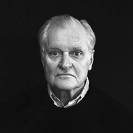
In addition to the acclaim, Ashbery has also attracted criticism, with some say that much of his poetry is incomprehensible. I’ve read some of that, and while I also struggled and often failed to understand it, I have to remember that a lot of critics said the same thing about T.S. Eliot.
For National Poetry Month, here are three (relatively easy-to-read) poems by John Ashbery.
Poem at the New Year
Once, out on the water in the clear, early nineteenth-century twilight,
you asked time to suspend its flight. If wishes could beget more than sobs,
that would be my wish for you, my darling, my angel. But other
principles prevail in this glum haven, don’t they? If that’s what it is.
Then the wind fell of its own accord.
We went out and saw that it had actually happened.
The season stood motionless, alert. How still the dropp was
on the burr I know not. I come all
packaged and serene, yet I keep losing things.
I wonder about Australia. Is it anything about Canada?
Do pigeons flutter? Is there a strangeness there, to complete
the one in me? Or must I relearn my filing system?
Can we trust others to indict us
who see us only in the evening rush hour,
and never stop to think? O, I was so bright about you,
my songbird, once. Now, cattails immolated
in the frozen swamp are about all I have time for.
The days are so polarized. Yet time itself is off center.
At least that’s how it feels to me.
I know it as well as the streets in the map of my imagined
industrial city. But it has its own way of slipping past.
There was never any fullness that was going to be;
you waited in line for things, and the stained light was
impenitent. ‘Spiky’ was one adjective that came to mind,
yet for all its raised or lower levels I approach this canal.
Its time was right in winter. There was pipe smoke
in cafés, and outside the great ashen bird
streamed from lettered display windows, and waited
a little way off. Another chance. It never became a gesture.
Just Walking Around
What name do I have for you?
Certainly there is not name for you
In the sense that the stars have names
That somehow fit them. Just walking around,
An object of curiosity to some,
But you are too preoccupied
By the secret smudge in the back of your soul
To say much and wander around,
Smiling to yourself and others.
It gets to be kind of lonely
But at the same time off-putting.
Counterproductive, as you realize once again
That the longest way is the most efficient way,
The one that looped among islands, and
You always seemed to be traveling in a circle.
And now that the end is near
The segments of the trip swing open like an orange.
There is light in there and mystery and food.
Come see it.
Come not for me but it.
But if I am still there, grant that we may see each other.
Glazunoviana
The man with the red hat
And the polar bear, is he here too?
The window giving on shade,
Is that here too?
And all the little helps,
My initials in the sky,
The hay of an arctic summer night?
The bear
Drops dead in sight of the window.
Lovely tribes have just moved to the north.
In the flickering evening the martins grow denser.
Rivers of wings surround us and vast tribulation.
Related:
John Ashbery reads his poem “My Philosophy of Life.”
“The Illusion of Intimacy: Discovering John Ashbery” by Randall Mann.
Postings and News Updates:
An essay on L.L. Barkat’s Stone Crossings: Finding Grace in Hard and Hidden Places and InsideOut: Poems was published over at Hearts and Minds Bookstore. It asks the question, “Why poetry?”
“The Philosophy of Composition” by Edgar Allen Poe, first published in Graham’s Magazine in 1846.
- Poets and Poems: Sandra Marchetti and “Diorama” - April 24, 2025
- Poets and Poems: Christina Cook and “Roaming the Labyrinth” - April 22, 2025
- Longfellow’s “Paul Revere’s Ride”: Creating a National Legend - April 17, 2025
Maureen Doallas says
You have chosen very well from among Ashbery’s poems.
On occasion, I’ve wanted to throw Ashbery’s books in the air but I’m not the type to abuse books so I’ve stuck with trying to get below the poet’s words. He can be rewarding — that last stanza of the second poem being just one bit of evidence of that. He can be terribly frustrating, too, a little too “honed”. Still, he’s not the least bit concerned who “gets” or likes him or not. He makes no apologies.
But “hear” how he reads on paper, where the words break, how meaning sometimes doubles up, how the wit is sharp and the intellect equally so, and especially admire the elegance of line and rhythm, the vision that’s deepened over the years.